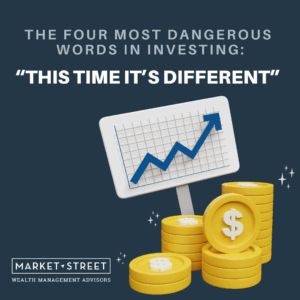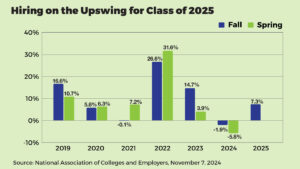
I’m not typically a New Year’s resolutions kind of guy. Not only do I like to think I walk a pretty disciplined path (I eat a fairly healthy diet, I exercise when I can, I don’t smoke, and I am definitely focused on saving more and spending less), but according to U.S. News, about 80% of resolutions fall by the wayside by the second week of February, which tells me most resolutions are a waste of time anyway.
And yet, let’s face it: 2018 was anything but typical! It’s no wonder that even the most seasoned investors are walking into 2019 feeling a bit gut-punched. After the longest bull market in history (ah, those halcyon years when all news was good news for the stock market!), we were suddenly thrown head first into a market that was right on the cusp of becoming a bona fide bear market and brought with it the highest volatility in years. It’s enough to make your head spin. So in the interest of helping you and every other investor keep your head where it belongs, here is my not-so-typical list of New Year’s resolutions:
- Turn off the financial porn.
Yes, it sounds crass, but in my own defense, I did not invent the term. According to the financial site Investopedia, financial porn is a “term used to describe sensationalist reports of financial news and products causing irrational buying that can be detrimental to investors’ financial health.” Everywhere you look, you can get 24-hour coverage of the capital markets. But is it a good thing? Absolutely not. Financial porn has two purposes: to sell advertising by getting you to come back again and again and again; and to encourage active trading by dramatically exaggerating the facts. Which can lead to your own stress and poor financial decision-making. And these marketers are good at what they do. A 2013 study by Princeton University found that, “on average, a person preoccupied with money problems exhibited a drop in cognitive function similar to a 13-point dip in IQ, or the loss of an entire night’s sleep.”[1] The takeaway: financial porn is designed to magnify stress levels and get investors like you to make poor decisions. Turn it off! - Get better at math.
Ever heard of the book How to Lie with Statistics? Over half a million people have, and I’m guessing that a lot of them probably work for financial news sites. Sadly, it’s not too hard to make good numbers look bad—or bad numbers look good. It’s all in how they’re communicated. Rest assured that every financial pundit pushing a “new” analysis wants nothing more than to tell a dramatic story so you will come to them for more answers tomorrow, and they’re happy to lie with statistics to make it happen. My suggestion: focus on the actual (but oh-so-boring) data. This chart shows the percentage of positive returns delivered by the S&P 500 Index from 1926 through 2017—including the financial crisis, the tech crash, and that time the dot-com bubble popped:

As you can see, over 10 years, the index delivered positive returns a whopping 95% of the time. Even more, not a single 20-year span delivered a negative cumulative return. That means that unless you need to pull a lot of cash out of your portfolio in the next 18 months or so, just sitting tight is almost always your best option. Instead of getting sidetracked by short-term market movement, focus on your long-term goals and stick to your strategy. Why? Because that’s what works. These numbers don’t lie!
- Don’t be “that guy.” We all know “that guy” or “that gal” who took their money and ran during the financial crisis. They did what they were sure was the smart move as the market flew south, put everything into cash, and waited… and waited… and waited. As it turns out, that move wasn’t so smart after all. Since the bottom of the financial crises in March 2009, the S&P 500 is up more than 355%! And that’s after the recent market downturn. Remember the old adage, “buy low, sell high”? There are two sides of that equation, and a downturn is the best possible time to buy low. Stocks are on sale right now. Either sit tight or go shopping. Just don’t be that guy who sells low.
- Work with an advisor who knows their stuff—and yours.
Ever heard of tax-loss harvesting? How about Donor Advised Funds? If you’re over 70½, have you made a QCD? Do you know the ins and outs of the new tax law (even as we find out more by the day)? I’ve always been a firm believer in trusting specialists to do their job. I’m happy to change my own oil, but when it comes to real mechanical problems, I turn to my mechanic to do the job. Unless, like a great financial advisor, you spend most of your day swimming in the details of strategic financial and tax planning, I can almost guarantee this: you don’t know what you don’t know. A good advisor will take the time to dive into every aspect of your financial life, recommend strategies that can make a real difference for your future, and give you greater financial confidence for decades to come. Start working with a trusted advisor today, and you’ll be more than ready for another New Year when 2020 comes calling. - Take a vacation.
The most important thing to remember in 2019 is that as long as you have a well-crafted, diversified, and tax-smart financial plan, the short-term news shouldn’t impact your long-term financial health. That makes 2019 the perfect time to take a vacation from watching the stock market. Ignore the news, limit your social media, and focus on what really matters. My personal resolution for 2019 is to be more present in every moment, which is why I asked for an old-fashioned, back-to-the-basics analog watch for Christmas. It’s beautiful, and the biggest benefit is that I don’t get a single text, email, or news alert when I’m busy being in the moment, playing with my 14-month-old son. I’m right where I should be, paying attention to the most important things of all. I hope you are too.
Happy New Year. Make it a great one!
[1] “Poor concentration: Poverty reduces brainpower needed for navigating other areas of life,” Princeton University, August 2013
<div class=”







